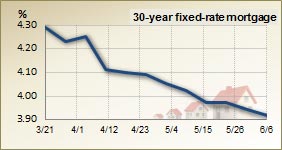BankRate.com
Homeowners who refinanced their mortgages in recent months seem ready
for another round of savings as rates tumble to new record lows.

30 year fixed rate mortgage – 3 month trend
The
benchmark 30-year fixed-rate mortgage fell to 3.92 percent from 3.94
percent last week, according to the Bankrate.com national survey of
large lenders. The mortgages in this week's survey had an average total
of 0.42 discount and origination points. One year ago, the mortgage
index was 4.65 percent; four weeks ago, it was 4.02 percent.
This
week's rate of 3.92 percent is the lowest level the 30-year-fixed has
reached since Bankrate started the survey more than 26 years ago. The
fixed rate has not increased in the weekly survey since early April when
it was 4.25 percent. The rate has reached a new low every week since
then, except one week in May when it stayed unchanged.
The
benchmark 15-year fixed-rate mortgage rose to 3.16 percent from 3.15
percent the previous week, and the benchmark 5/1 adjustable-rate
mortgage fell to 2.99 percent from 3.01 percent.
Why do rates keep falling?
The
economic chaos in Europe is one of the main factors pushing rates
lower, says Brett Sinnott, director of secondary marketing at CMG
Mortgage in San Ramon, Calif.
Greece remains in financial trouble,
even after receiving a bailout of more than $160 billion. Recent
reports say the country may go broke as early as July.
Spain may
be the next shoe to drop. The European Commission recently indicated
that emergency policy measures may be needed to help recapitalize
Spain's struggling banks.
Another
factor contributing to the low rates is the unemployment situation in
the United States, says John Stearns, a mortgage banker at American
Fidelity Mortgage Services in Mequon, Wis. The disappointing jobs report
released last week showed that the economy added only 69,000 jobs in
May. Economists had expected at least 150,000 new jobs.
The jobs
report, coupled with the European debt crisis, made nervous investors
seek safety in U.S.
Treasury bonds last week. The high demand for bonds
pushed the yield, or rate of return, on the 10-year Treasury note below
1.5 percent -- a record low. Mortgage rates often follow the direction
of Treasury yields.
Re-refinancers want the new lows
Lower-than-expected
mortgage rates have been attracting refinancers who want to
re-refinance, says Mathew Carson, a broker at First Capital Group Inc.
in San Francisco.
"Last week was incredibly busy," Carson says.
"When the yield (on 10-year Treasury bonds) dropped under 1.5 percent, a
lot of our clients were back on the phone looking to refinance again.
Some of them refinanced in the last six months."
Carson says he
has quoted 30-year mortgages with rates as low as 3.62 percent this
week. That's a deal even for borrowers who refinanced at 4.3 percent or
4.5 percent a few months ago, he says.
Should you re-refi?
Depending
on the size of the loan and especially in high-cost areas such as San
Francisco, the lower rates could translate into significant monthly
savings, Carson says.
Borrowers with smaller loans, of $100,000 or
less, wouldn't save much by refinancing if they have already refinanced
in recent months, says Stearns.
Closing costs also need to be taken into consideration when borrowers ponder whether they should try to refinance again.
Many
lenders offer what they call no-closing-cost refinances. That doesn't
mean the lender won't charge you refinance fees. It means the lender
will charge you a slightly higher interest rate to cover the fees.
With rates so low, many borrowers choose this option to refinance without having to pay for closing costs out of pocket.
When considering a refinance or a re-refinance, there's no one-size-fits-all rule, Stearns says.
"Look
at everything that you looked at when you refinanced the last time," he
says. "Look at the new interest rate, loan amount, the monthly
payments, the closing costs ... once you analyze all of that, the
refinancing question answers itself."

No comments:
Post a Comment
Thank you for your comment.